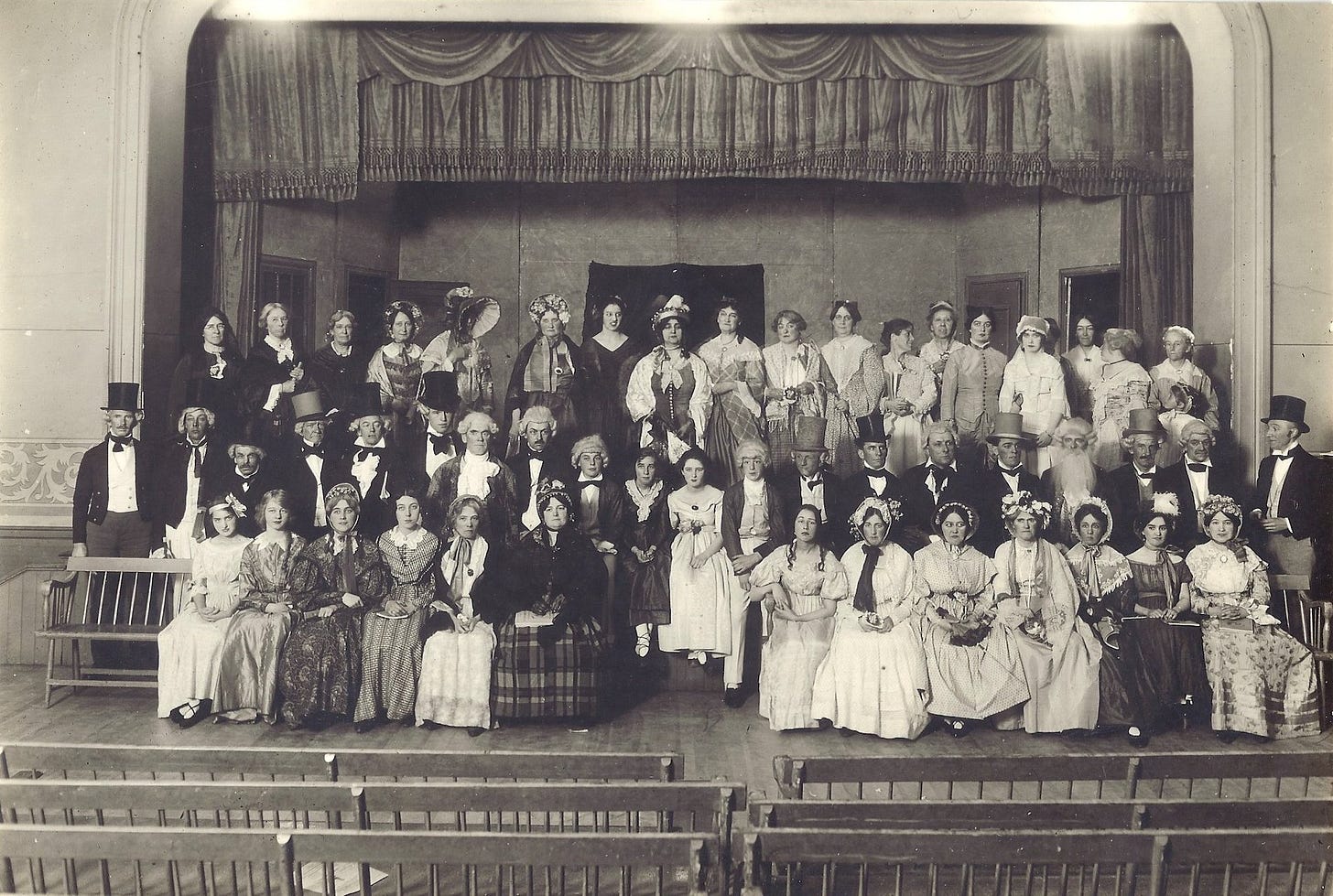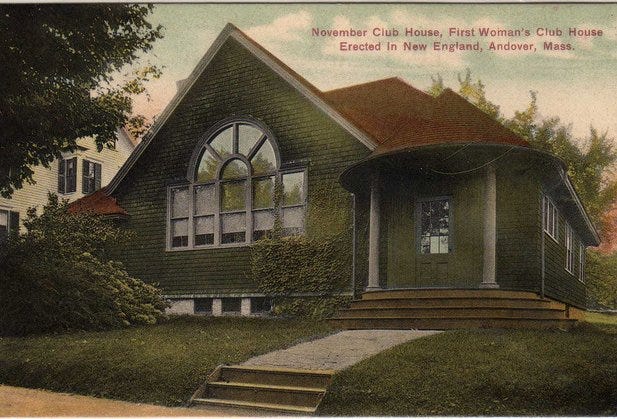Frye Village Fridays: Hardy Brush (pt.4) “All sorts of plays were attempted”
The Barnstormers, amateur thespians, and other diversions
History Buzz….stories too good not to share!
To share this post via email use the Share button below, then click on Copy Link, and paste that into your email to Share the Buzz. Or use one of the other social media options.
Perhaps inspired by his mother, Mrs. Charles A. (Lizzie) Hardy who was a professional dramatic reader, Frank Herbert Hardy and his wife Edith were community theater thespians.
A few months after Frank’s marriage to Edith Downing in October 1896, Frank headlined in production of “Rio Grande,” a Military Drama in Three Acts, staged by the International Order of Odd Fellows, Andover Lodge.
If you read last week’s post, you might recall this from an Andover Townsman article on Frank Hardy’s candidacy for Selectman.
For the first time a resident of Andover the name of Frank H. Hardy has come before the citizens for public office. Although one of the most prominent young men of the town, Mr. Hardy has never been a seeker of public honors, but comes into the field this year as one of the candidates for selectman. He is a young man of pleasant personality and has made quite a reputation for himself as a reader and entertainer.
The Barnstormers
From a 2011 Andover Historical Society 100th anniversary “Andover Stories” article by Pam Smith printed in the Townsman:
While there have been countless church groups, schools and women's guilds sponsoring dramatic readings, concerts, lectures, films, singing, and even whistling, prior to the early 1900s, there has also been a long procession of established community theater companies.
Continuing Pam Smith’s Andover Stories article:
The Andover Dramatic Club was active by 1911. To see the shows you had to become a member and pay a $2 fee. In October of that year, the Andover Dramatic Club decided to adopt the title of The Barnstormers for its official name. The Andover Townsman stated "its purpose is amusement and we feel that all residents of Andover should be a part of the organization."
The casting policy of The Barnstormers was "to ask its active members to play alternatively important parts and very smallest roles, in that way giving each one opportunity to express the best that is in him, in giving the managers the chance to learn in what line each member is most successful, so that in time they could appropriately cast every play."
The Barnstormers became so popular they eventually extended their performances and allowed tickets to be sold to the general public. In 1914 and 1915 they held benefits for the Belgium Relief Fund. During World War I they scaled back their performances because a number of their key members had joined the armed forces. They continued to perform until 1926. On the announcement of their decision to disband, the Townsman published their entire 15-year performance history.
Frank Hardy was president of The Barnstormers until 1926 when a key member of the group, Mr. Coggeshall, moved from Andover. At that point, the group disbanded after 15 seasons. They went,
“out in a blaze of glory, solvent, with a balance of three cents in the treasury...”
Mr. and Mrs. H. Winthrop Peirce were the power couple behind the Barnstormers. They were organizers, managers, and actors, and Mr. Peirce was a well-known scenery and costume designer.


Barnstormers membership list was a who’s-who of early 20th century Andover: Mr. and Mrs. Frank Hardy, Mr. and Mrs. H Winthrop Peirce, Mr. and Mrs. Addison LeBoutillier, Miss Mary Byers Smith, Nathan C. Hamblin, Percival Dove...the list goes on.
The initial performance, before the society even had a name was “For One Night Only,” managed by Mrs. Peirce and staged in the November Club’s clubhouse. The success of that evening went far ahead of the expectations of the management. Not only was the little hall crowded, with standing room at a premium, but many subscribers were unable to even get inside the door.
After that The Barnstormers moved performances to the Town hall, but even with the additional room,
...many was the afternoon spent in the lower Town hall with a book or knitting so that one might secure a good place in line and be sure of a desirable seat!
“Mouse Trap,” George Bernard Shaw’s “You Never can Tell,” and “The School for Scandal,” were presented along with a few original works written by society members. One memorable amateur title was “Not Enough Mustard.”
Hardy’s wife Edith Hardy was considered to be one of Andover’s best actresses.
Who can forget Mrs. Frank Hardy...as she played the leading part in “Mrs. Alexander’s Progress? It is incredible that nearly fifteen years since she was hear to exclaim, “Eliza Smith, you fool!”
The play, “Mrs. Alexander’s Progress,” by Louie R. Stanwood was first presented by the Harvard Dramatic Club at Brattle Hall in Cambridge in 1910.
But Frank Hardy himself was no slouch,
Of Mr. Hardy’s work, too much cannot be said in his praise. Those who have worked under him invariably award him the palm as the most efficient coach, patient, tireless, bringing out the very best in the materials with which he had to work.
Hardy acted in productions as well including For One Night Only, The Violin Maker of Cremona, Time Is Money, The Man of Destiny, The Big Idea, and The Dover Road.
Frank Hardy had the starring role of Filippo in The Violin Maker of Cremona. A summary of the plot:
A contest is being held in Cremona for the best violin, with Giannina's hand in marriage as the prize. Filippo is secretly in love with her, but is also ashamed of his disability, so he switches his superior violin with that of another apprentice, Sandro, whom Giannina loves. The film ends with Filippo alone in his room, crushed and dejected, yet contented in the thought that he had made her happy.
Violin Maker of Cremona was a 1909 silent movie starring Mary Pickford. It is thought to be her first appearance on film.
Once an actor, always an actor
After The Barnstormers disbanded, Mrs. Frank Hardy continued her community theater work through the Dramatic Department of the November Club, where she served on the play-selection committee.
Between 1936 and 1939, the next generation of amateur Andover thespians performed as The Adventurers, and the tradition continues to today.
It might be too much to quote the 1958 TV series, "There are eight million stories in the naked city,” but as in any community, Andover has its fair share of stories.
Click here to read Gail Ralston’s next installment of the story - which will appear only on the History Buzz website - in which she reveals how membership in the Masons influenced the Board of Selectmen’s decisions. That’s too good to pass up!












Theater history! The vast subjects represented in the ACHC's collections are astounding. Great work on this piece.